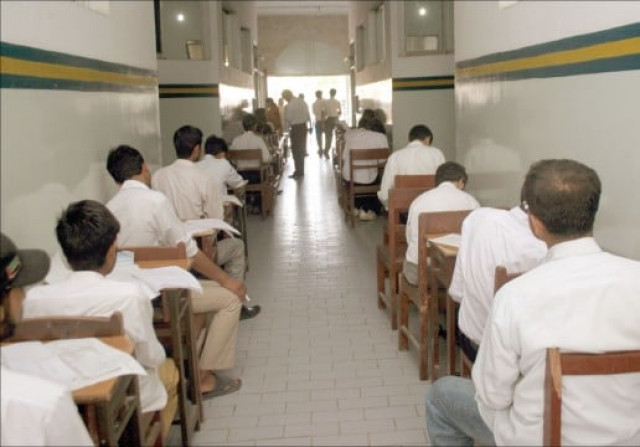Monitoring system: ‘Little scope for cheating at matric exams’
BISE chairmen have been conferred magisterial powers to try students.

File photo of students writing their matric exam. PHOTO: EXPRESS/FILE
The Lahore Board of Intermediate and Secondary Education has reinforced its monitoring and law and order arrangements in collaboration with the city government and the Urban Unit for the Secondary School Annual Examinations starting across the province today (Friday).
As many as 2.1 million candidates from the Punjab will sit the exam this year, 431,279 from Lahore. Officials at the BISE Lahore have said that several steps have been taken to avoid any untoward incidents during the examinations this year...the exams will be “transparent and fair”.
Lahore BISE Chairman Muhmmad Nasrullah Virk said they had taken several steps to ensure smooth conduct of the examinations. “The board has not only conducted training for invigilation and marking the exams, but has also collaborated with the city government and the Planning and Development Department’s Urban Unit on a monitoring system.”
A notification issued by the Home Department on Friday announced that chairmen of the Lahore and Sahiwal, Bahawalpur, Faisalabad, DG Khan, Rawalpindi, Sargodha and Gujranwala BISE had been conferred magisterial powers to try offences under Section 3(2) of the Punjab Universities and Boards of Intermediate and Secondary Education Malpractices Act 1950, (impersonation). The notification stated that the officers would have the said authority in their respective jurisdictions during exams...this is being carried out in consultation with the Lahore High Court.

Notification by the office of DCO Ahmed Javed Qazi, issued on Thursday, announced that only the supervisory staff and students appearing in the exams would be allowed within 100 yards of the examination centres. Demonstrations have and assembly of more than four people has also been banned in and around the centres.
The BISE chairman told a briefing meeting on Friday that the exams would be monitored through a five-tier system for which a province-level headquarters had been established at the Higher Education Department. Monitoring cells have been set up at all the BISEs. The exams will be monitored by mobile squads alongside the supervisory and invigilation staff at each centre.
A cell phone facility has been set up, in collaboration with the Urban Unit, for examination centre superintendents, whose names, mobile numbers and centre details have been entered in a database. The superintendents will be able to request security in case of a law and order situation, procure materials from the BISE and mark attendance using their cell phones.
Virk said more than 6,000 staff members will be part of the monitoring system.
“Unqualified teachers will not be used,” he said when asked about incidents of errors in the marking of papers. He regretted that teachers had not taken training seriously in the past, “but that has changed”. “The board cannot deal with policy matters but we are working towards establishing SOPs and building capacity.”
There will be 3,784 examination centres across the province, 772 in Lahore. 3,750 superintendents and 33,452 invigilators have been assigned duties and more than 270 mobile inspectors will monitor centres and submit daily reports to the board authorities.
Lahore BISE Examinations Controller Muhammad Farooq said the board was moving towards a computerised system to minimise human errors. He said other than the (80029) SMS service and training for examiners, they were also trying to incorporate technology in assessment.
A monitoring system has been set up to observe performance at 15 marking centres where subject specialists will be present alongside examiners. “No examiner will be allocated more than 50 scripts,” Farooq said, the previous limit was 75. Examiners may be handed more scripts for Pakistan Studies and Islamiyat exams, he said. Teachers will be assigned subjects to mark in accordance with their qualifications, he said. A fault detection system will ensure 100 per cent accuracy in the evaluation of exam scripts before the results are declared.
Published in The Express Tribune, March 1st, 2014.


















COMMENTS
Comments are moderated and generally will be posted if they are on-topic and not abusive.
For more information, please see our Comments FAQ